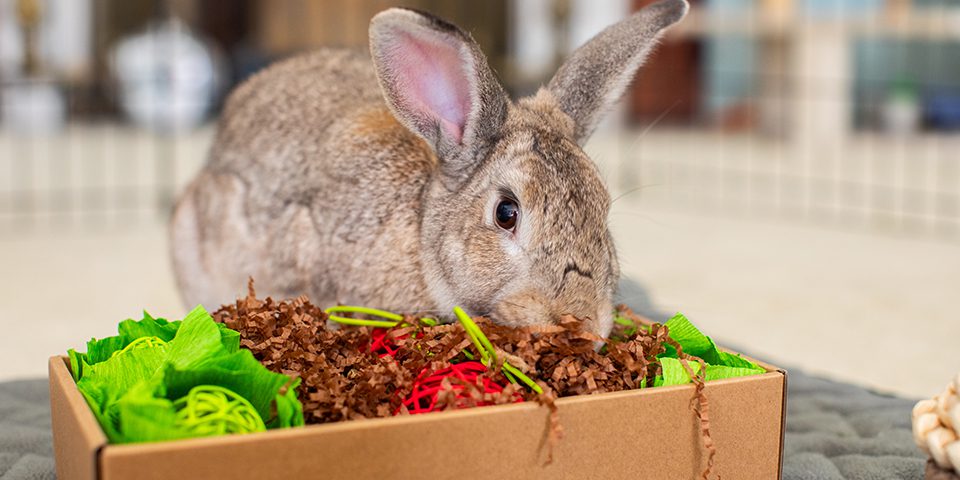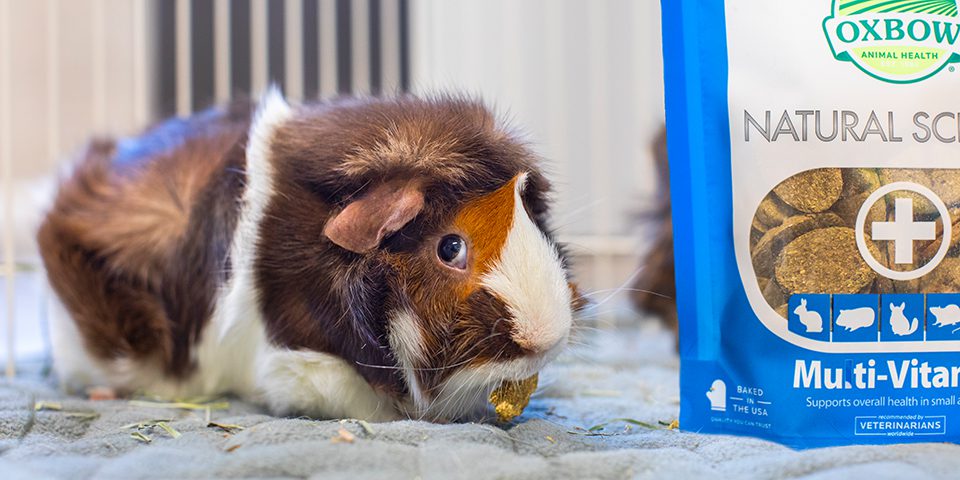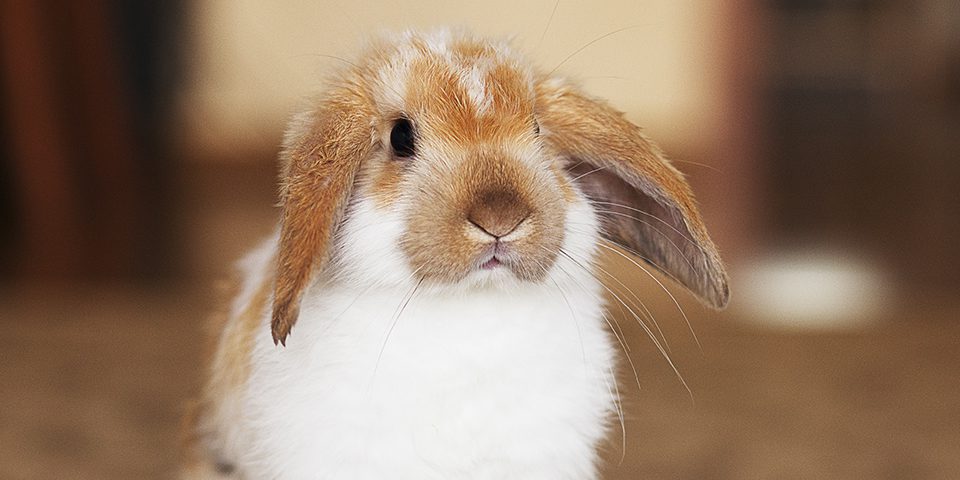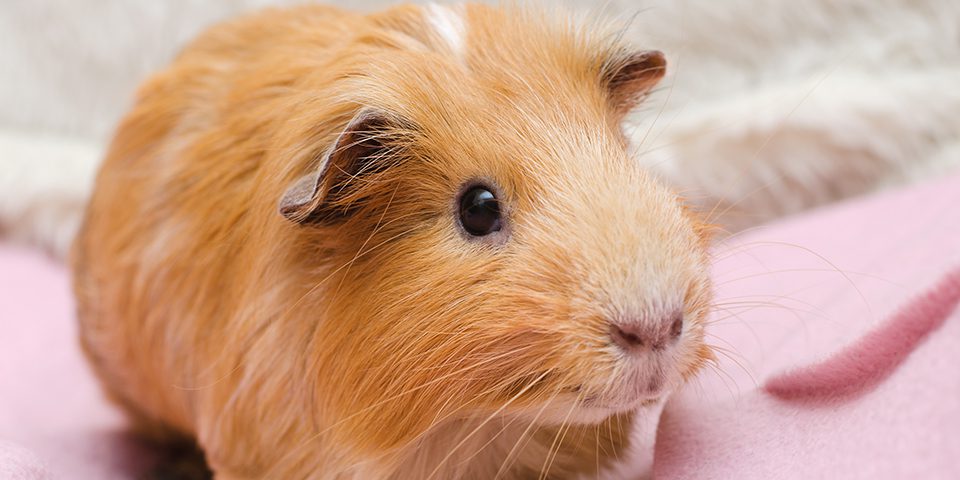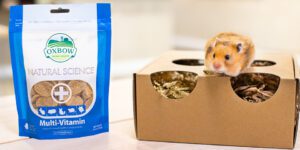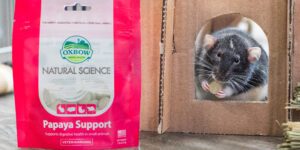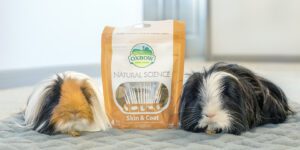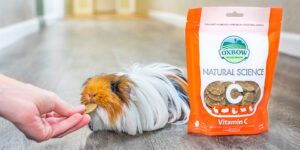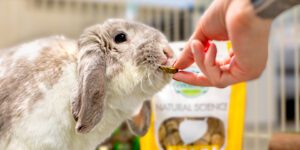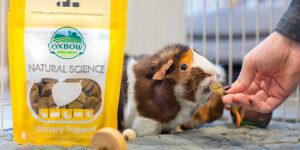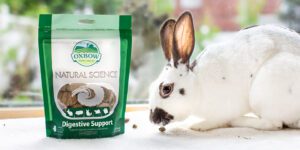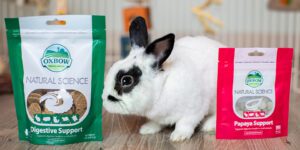Author: Dr. Cayla Iske, PhD
Updated: March 22, 2024
Supplement Guide: Vitamins for Rabbits, Guinea Pigs & Hamsters
Oxbow’s Natural Science Multi-Vitamin supplement was formulated specifically for small pets. A multi-vitamin supplement can be useful in helping your little one through difficult times, such as during times of stress or recovery, but can also assist in providing the right vitamins and minerals that your pet needs to help address more chronic conditions.
This guide will give you the information you need about vitamins for rabbits, guinea pigs, hamsters, and other small pets.
In this article, we’ll cover the following topics:
- Why Are Vitamins Important for Small Animals?
- Which Small Pets Can Benefit from Vitamin Supplements?
- Is a Multivitamin Supplement Right for My Pet?
- Natural Science Multi-Vitamin Ingredient Functionality
- Feeding Recommendations for Natural Science Multi-Vitamin
Why Are Vitamins Important for Small Animals?
In the early 1900’s, vitamins were called “vital amines” in reference to their importance for life. Vitamins are an extremely important part of any animal’s diet but can sometimes be overlooked because they are needed in relatively small quantities.
Some species may require different amounts of each vitamin, and in some cases different species may require vitamins that other species don’t. A well-known example of this is the requirement of supplemental vitamin C in humans, primates, and guinea pigs. Vitamin C needs to be ingested through food for these species, but many other species can synthesize their own vitamin C and thus do not require it in the daily diet.
A diet imbalanced in any required vitamin can lead to very serious health consequences. For example, a deficiency in vitamin A can lead to impaired eyesight and even blindness, while excessive levels of vitamin A can result in rash, skin and coat issues, and even liver damage. It’s imperative with any supplement that you consider your specific pet’s needs and consult with your veterinarian before adding any kind of additional vitamin to your pet’s diet.
Which Small Pets Can Benefit from Vitamin Supplements?
Small animals that can benefit from vitamin supplements include but are not limited to:
- Rabbits
- Guinea Pigs
- Hamsters
- Gerbils
- Chinchillas
- Rats
- Mice
Is a Multivitamin Supplement Right for My Pet?
High-quality, commercially available fortified foods should always contain the species-specific vitamins that an animal needs to survive. However, there are unfortunately still many low-quality foods on the market. This, along with other issues such as underlying disease, can lead to nutritional deficiencies in small pets. Follow the guidance of your small mammal savvy veterinarian to determine if offering a multi-vitamin supplement in addition to transitioning your pet’s diet from a low-quality food to a high-quality food is the right option for your small animal.
A few common scenarios that could call for vitamin supplementation include:
- Cases where monitoring individual food intake is difficult (such as housing multiple animals in the same enclosure)
- Animals that don’t consistently eat their pellets
- Pets suffering from environmental stressors such as:
- Moving
- Pet boarding while family is on vacation
- New animals in the home
- New humans in the home
- Pets with underlying chronic health conditions
- Senior animals
- Animals under physiological stress, including nursing or pregnant animals
- If you’ve chosen to feed a pellet-free diet. Oxbow does not recommend a completely pellet-free diet unless it is specifically recommended by your veterinarian. Feeding recommendations for a multi-vitamin in this scenario should be altered with veterinary guidance.
Natural Science Multi-Vitamin Ingredient Functionality
Natural Science Multi-Vitamin was formulated specifically to contain proper proportions of stable and high-quality vitamins in a palatable and nutritionally appropriate format.
Our Multi-Vitamin includes a full spectrum of vitamins to supplement any diet and boost the intake of vitamins that 1) a pet may be deficient in, or 2) that may be beneficial in higher doses.
| Vitamin | Key Functions |
|---|---|
| Vitamin A | Maintenance of vision; immune system support; cell growth; skin and tissue health |
| Vitamin C (L-Ascorbyl-2-Monophosphate) | Growth and repair of tissues; immune function; iron absorption; antioxidant |
| Vitamin D3 | Calcium balance; bone and muscle health |
| Vitamin E | Antioxidant; immune system support |
| Vitamin K (Menadione Sodium Bisulfite Complex) | Proper blood clotting (prevents excess bleeding); bone health |
| B-Complex Vitamins | |
| Thiamine (B1) | Carbohydrate metabolism; immune function; nervous system function |
| Riboflavin (B2) | Proper metabolism of nutrients; red blood cell production |
| Niacin (B3) | Proper metabolism of nutrients; nervous system health; skin health |
| Pantothenate/Pantothenic Acid (B5) | Proper metabolism of nutrients; nervous system health; hormone synthesis |
| Pyridoxine (B6) | Proper metabolism of nutrients; nervous system function; immune function |
| Biotin (B7) | Proper metabolism of nutrients; hair, skin, & nail health |
| Folic Acid/Folate (B9) | DNA synthesis; red blood cell production; cellular growth and function |
| Vitamin B12 | Nerve tissue health; DNA synthesis; brain function; red blood cell production |
| Choline | Cell structure maintenance; fat metabolism |
Daily Feeding Recommendations for Natural Science Multi-Vitamin
Bear in mind that vitamin needs and feeding directions can change from species to species and pet to pet. Before giving vitamins to your pet, be sure to consult with your veterinarian to better understand how supplementation can benefit your pet.
- Herbivores (such as rabbits, guinea pigs, chinchillas):
- 1/2 to 2 tabs of Multi-Vitamin per day, depending on weight
- Omnivores (such as hamsters, gerbils, mice, and rats):
- Smaller species (mice, dwarf hamsters): 1/8 tablet daily
- Larger species (rats, gerbils, Syrian hamsters): 1/4 tablet daily
Multi-Vitamin FAQs
Adding any supplement to your pet’s diet deserves a conversation with your veterinarian and evaluation of what is best for your small companion. Past health history, as well as current medications, should be factored into this decision. There are many additional questions that can arise during this evaluation.
Whether adding a multi-vitamin supplement to your pet’s diet for the short or long-term, below are some specific questions we receive about our Natural Science Multi-Vitamin and vitamin needs for small pets. Check out our Supplement FAQ blog for additional information.
Is Natural Science Multi-Vitamin Suitable for Herbivores?
Oxbow’s supplements are designed with small herbivores in mind. As a hay-based tablet, our Multivitamin supplement consists of quality fiber, an ingredient that small herbivores need to maintain optimal GI function. Small herbivores should have a diet that consists of at least 70% grass hay. A high-quality fortified food, species-appropriate greens and vegetables, and healthy treats should make up the remaining 20%, 8%, and 2% of a balanced diet respectively.
Is Natural Science Multi-Vitamin Suitable for Omnivores?
Oxbow’s Multi-Vitamin was designed for omnivores as well. At the core of a small omnivore’s diet should be a uniform and complete fortified food, paired with a wide variety of other foods such as greens, veggies, grains, proteins, and fats. In partnering with your veterinarian, you might determine that adding Natural Science Multi-Vitamin would be beneficial for your small omnivore.
Vitamins for Rabbits
Do rabbits need vitamins?
Rabbits need vitamins and minerals just like any other animal. These essential nutrients should typically come from the daily intake of high-quality fortified food that provides uniform nutrition.
Should I give my rabbit vitamins?
During times of stress, illness or recovery, providing additional vitamins to your rabbit through supplementation may be appropriate. Consult with your rabbit’s veterinarian to learn more about if your rabbit could benefit from supplements.
Are multivitamins appropriate for rabbits?
A multivitamin for rabbits can be appropriate during times of additional need, but the supplement should be formulated with rabbits in mind. Before offering any kind of multi-vitamin, make sure that the supplement you want to give your rabbit is either made for small herbivores or is a supplement that your vet specifically approves.
Vitamins for Guinea Pigs
Do guinea pigs need vitamins?
Just like other animals, guinea pigs need vitamins and minerals. These micronutrients should come from a high-quality fortified food that is designed to provide uniform nutrition in every bite. Guinea pigs in particular need Vitamin C as they cannot synthesize it on their own. This species may benefit from a daily vitamin C supplement.
Should I give my guinea pig vitamins?
Providing a supplementary multivitamin for guinea pigs may be appropriate if your pet is stressed, ill or recovering from a surgical procedure. Consult with your guinea pig’s veterinarian before offering a supplement to learn more about whether or not a multi-vitamin will benefit your pet based on their current health status.
Are multivitamins appropriate for guinea pigs?
Multi-vitamins might be beneficial to guinea pigs at certain times (such as times of physiological or emotional stress), but they should be formulated with guinea pigs in mind. The supplement you give to your guinea pig should either be made for small herbivores or should be a supplement that is approved by your cavy-savvy veterinarian.
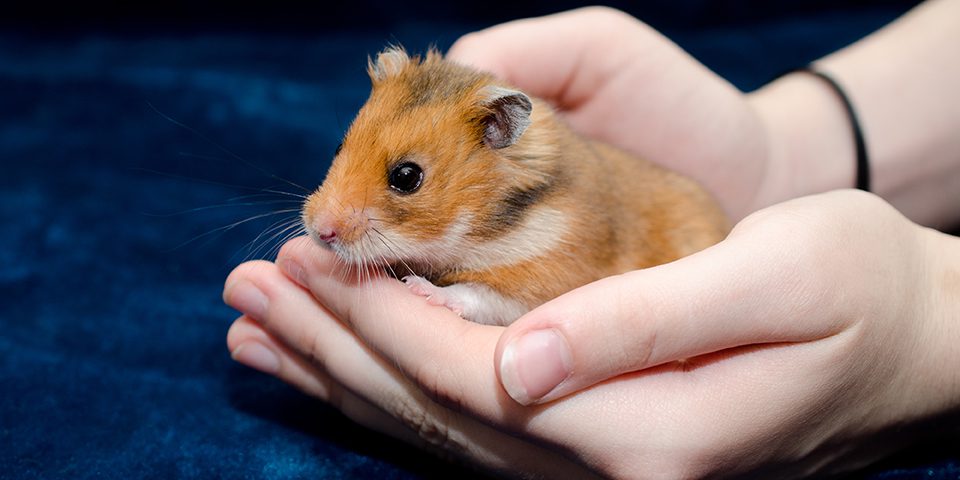
Vitamins for Hamsters
Do hamsters need vitamins?
Hamsters need micronutrients like any other animal to stay happy and healthy. Vitamins and minerals should come from a uniformly nutritious, high-quality fortified food that’s designed for your pet’s species.
Should I give my hamster vitamins?
Aside from your hamster’s fortified food, a supplementary multivitamin for hamsters may be recommended if your pet has an acute or chronic health condition. Consult with your veterinarian before offering a supplement to understand if your hamster may benefit from supplements.
Are multivitamins appropriate for hamsters?
Multi-vitamins might be an appropriate addition to your hamster’s diet, especially if they are undergoing periods of stress or illness. However, the supplement you pick should be formulated with hamsters in mind. Consult your veterinarian for their recommendations on a multi-vitamin brand and dosing instructions for your hamster. Oxbow’s Multi-vitamin may be a good fit for your little one, as it is designed for small animals like hamsters.
What’s the difference between fat-soluble and water-soluble vitamins?
There are two broad categories of vitamins: fat-soluble and water-soluble. Natural Science Multi-Vitamin contains both of these types of vitamins.
Fat-soluble Vitamins
Fat-soluble vitamins (including A, D, E, and K) undergo the process of absorption, travel through the lymphatic system, and are absorbed into the bloodstream in a manner similar to fats. These vitamins can be utilized upon absorption or stored in the body and used when needed long after consumption.
Water-soluble vitamins
Water-soluble vitamins (such as vitamin C and the B complex vitamins) are absorbed more directly into the bloodstream. They can be utilized immediately after absorption but cannot be stored in the body. For this reason, water-soluble vitamins have a lower risk for toxicity but are required more often in some animal diets.
Vitamins, while required in the diet of all animals, are only needed in very small quantities. They therefore collectively fall into a group known as micronutrients.
Where to Buy Natural Science Multi-Vitamin
Natural Science Multi-Vitamin can be found in online or brick-and-mortar stores. Check out our store locator to find a retailer near you that carries Oxbow’s premium products.

